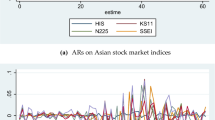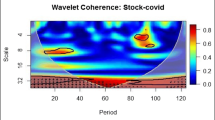Abstract
The US stock market has displayed considerable excess volatility during the different waves of the COVID-19 pandemic. Notably, while most US indexes fell abruptly and lost about 20–30% during the first wave and in times of lockdowns, unlike the global financial crisis of 2008–2009, the correction was rapid, and most stock indexes subsequently exceeded their pre-COVID levels. Accordingly, it is important to assess whether this dynamic is driven more by a switch in fundamentals or whether it is simply due to a conversion of investors’ emotions. This chapter aims to analyze the dynamics of the US (S&P500) stock index, both before and during the ongoing coronavirus pandemic. Our findings point to three interesting results. First, US stock returns are driven by both macrofinancial and behavioral factors. Second, a two-regime multifactorial model reproduces the dynamics of the US market in which financial factors play a key role whatever the regime is, while the impact of behavioral factors appears more significant only in the second regime when investors’ anxiety exceeds a given threshold. Third, our in-sample forecasts point to the superiority of our nonlinear multifactorial model to forecast the dynamics of the US stock market.
Access this chapter
Tax calculation will be finalised at checkout
Purchases are for personal use only
Similar content being viewed by others
Notes
- 1.
To save space, we do not report the results of the unit root tests but the results are available upon request.
References
Albulescu CT (2021) COVID-19 and the United States financial markets volatility. Finance Research Letters, 38, January
Apergis E, Apergis N (2021) Inflation expectations, volatility and Covid-19: evidence from the US inflation swap rates. Appl Econ Lett 28(15):1327–1331
Bai J, Perron P (2003) Computation and analysis of multiple structural change models. J Appl Econ 18(1):1–22
Baker SR, Bloom N, Davis SJ, Kost K, Sammon M, Viratyosin T (2020) The unprecedented stock market reaction to COVID-19. Rev Asset Pricing Stud 10(4):742–758
Bandopadhyaya A, Truong D (2010) Who Knew: Financial Crises and Investor Sentiment. Working Paper. University of Massachusetts Boston. Scholar Works at UMass Boston
Bansal T (2020). Behavioral finance and COVID-19: cognitive errors that determine the financial future. Available at SSRN 3595749
Bourghelle D, Jawadi F, Rozin P (2022) Do collective emotions drive bitcoin volatility? A triple regime-switching vector approach. J Econ Behav Organ 196:294–306
Cappelle-Blancard G, Desroziers A (2020) The stock market is not the economy? Insights from the COVID-19 Crisis. CEPR Covid Economics, 2020
Chundakkadan R, Nedumparambi E (2021) In search of COVID-19 and Stock Market behavior. Glob Finance J, 100639
De Bondt WF, Thaler RH (1995) Financial decision-making in markets and firms: a behavioral perspective. Handbooks Operat Res Manage Sci 9:385–410
Dickey OA, Fuller WA (1979) Distribution of the estimators for autoregressive time series with a unit root. J Am Stat Assoc 74:421–431
Dickey OA, Fuller WA (1981) Likelihood ratio statistics for autoregressive time series with a unit root. Econometrica 49(4):1057–1072
Goldstein I, Koijen R, Mueller HM (2021) COVID-19 and its impact on financial markets and the real economy. Rev Financ Stud 34(11):5135–5148
Gormsen, N. and Koijen, R. (2020), Coronavirus: impact on stock prices and growth expectations, Working Paper n°2020-22. University of Chicago, Booth Friedman Institute for Economics
Hirshleifer D (2015) Behavioral finance. Annu Rev Financ Econ 7:133–159
Igan D, Kirti D, Perioa SM (2020) The disconnect between financial markets and the real economy. IMF Research. Special note series on COVID-19
Landier A, Thesmar D (2020). Earnings expectations during the COVID-19 crisis. Rev Asset Pricing Stud 10(4):598–617
Lee H (2020) Exploring the initial impact of COVID-19 sentiment on US stock market using big data. Sustainability 12(6)
Mazur M, Dang M, Vega M (2021) COVID-19 and the march 2020 stock market crash. Evidence from S&P 500. Financ Res Lett 38
Ortmann R, Pelster M, Wengerek ST (2020) COVID-19 and investor behavior. Financ Res Lett 37:101717
Phillips PC, Perron P (1988) Testing for a unit root in time series regression. Biometrika 75(2):335–346
Sergi BS, Harjoto MA, Rossi F, Lee R (2021) Do stock markets love misery? Evidence from the COVID-19. Financ Res Lett 42:101923
Shiller RJ (2001) Exuberant reporting. Harv Int Rev 23(1):60–66
Subramaniam S, Chakraborty M (2021) COVID-19 fear index: does it matter for stock market returns? Rev Behav Finance 13(1):40–50
Thaler RH (1999) The end of behavioral finance. Financ Anal J 55(6):12–17
Vasileiou E (2021) Behavioral finance and market efficiency in the time of the COVID-19 pandemic: does fear drive the market? Int Rev Appl Econ 35(2):224–241
Yu X, **ao K, Liu J (2022). Dynamic co-movements of COVID-19 pandemic anxieties and stock market returns. Finance Research Letters, 46, Part A
Author information
Authors and Affiliations
Corresponding author
Editor information
Editors and Affiliations
Rights and permissions
Copyright information
© 2023 The Author(s), under exclusive license to Springer Nature Switzerland AG
About this chapter
Cite this chapter
Bourghelle, D., Grandin, P., Jawadi, F., Rozin, P. (2023). What Drives the US Stock Market in the Context of COVID-19: Fundamentals or Investors’ Emotions?. In: Bourghelle, D., Grandin, P., Jawadi, F., Rozin, P. (eds) Behavioral Finance and Asset Prices. Contributions to Finance and Accounting. Springer, Cham. https://doi.org/10.1007/978-3-031-24486-5_9
Download citation
DOI: https://doi.org/10.1007/978-3-031-24486-5_9
Published:
Publisher Name: Springer, Cham
Print ISBN: 978-3-031-24485-8
Online ISBN: 978-3-031-24486-5
eBook Packages: Economics and FinanceEconomics and Finance (R0)




